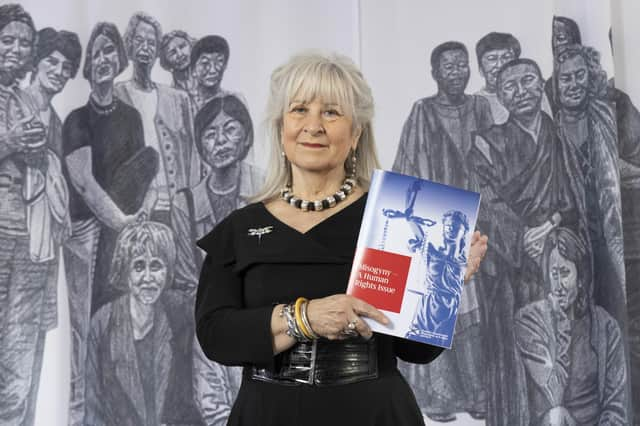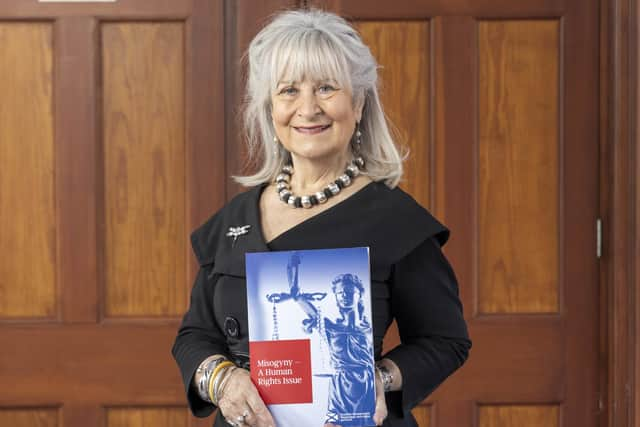The woman behind proposals to criminalise misogyny in Scotland hopes changes to the law will improve gender equality


The woman behind proposals to introduce legislation against misogyny in Scotland says she hopes the move will change people’s attitudes towards women and girls.
Baroness Helena Kennedy KC has been leading the discussion on criminalising abusive and humiliating behaviour directed at women, and says making misogynistic harassment a criminal offence could provide greater protection for women. Such a law could potentially cover threatening, abusive or sexual behaviour based on women’s gender which can make them feel degradation, humiliation or distress, including online and on the street.
Advertisement
Hide AdAdvertisement
Hide AdThe Scotsman spoke to Baroness Kennedy on what she hopes a change in the law will bring, but says she understands why many women might be sceptical of seeing any real progress.


Baroness Kennedy said: “This is essentially about attitudes, and the attitude of men towards women. It is a really simple notion that somehow because of male primacy, women get to play a secondary role in our society.
“The remnants of that remain in the heads of so many people, and women are socialised to think in this certain way.
“It is clear women don’t have any confidence the law is going to change the situation, which doesn’t surprise me when it has failed women up until now.
“But we need legislation to change people’s attitudes and in getting people to think differently about how they behave.
“For example when I was in my 20s people used to drive home after drinking, but we have all learned to change that behaviour because there are laws in place now.”
Criminalising this sort of behaviour could have a very wide scope, depending on the severity of the harassment or abuse in question, but Baroness Kennedy hopes it can be seen more as an opportunity to educate and challenge prejudicial attitudes within our society.
She said: “Let’s imagine a woman comes out of a club and a guy starts saying he wants to ‘shag her’ and comes on to them in a heavy handed way.
Advertisement
Hide AdAdvertisement
Hide Ad“If the woman says ‘shove off’, it can turn ugly with comments about how they look and how they present themselves, and the whole thing can be degrading, threatening and put women in fear.
“I don’t want folk sent to jail for that, because we have enough folk in jail, but I do think there should be some sort of order created where they are required to attend classes about their behaviour and misogyny so they can learn about how it feels for women to be confronted by men’s attitudes.
“A lot of people will ask if the police should be dealing with street offences like this, but I think women want to have a way to deal with this when it happens.”
She added men have to take the lead when it comes to challenging and calling out this sort of behaviour. Baroness Kennedy also added the public consultation found men who have young daughters are particularly anxious about seeing their child experiencing this.
For many women this sort of abuse is not just out and about on the street – often it can be online, particularly on social media.
The online safety bill is currently going through Westminster, which will go some way to tackling the “huge” problem of misogyny and sexism online - but this is also something the group discussing criminalising misogyny in Scotland have considered.
Baroness Kennedy said: “Incel groups have huge influence - these are groups of men who are very angry about the rise of women in society.
“They feel entitled to hold these positions of power and feel anger and hostility towards women, and this can be expressed in some pretty vile forms online.
Advertisement
Hide AdAdvertisement
Hide Ad“People like Andrew Tate have very large followings, particularly amongst adolescent boys who are still unsure about their masculinity and how to succeed in life.
“I was talking to a woman the other day who is a teacher, and most of her boys followed Andrew Tate and thought he was cool – they were idolising him.”
It is hoped challenging this kind of behaviour will lead to the whole of society becoming more equal for women.
Baroness Kennedy added: “There are microaggressions women have to put up with which undermine their participation in society.
“Why would you want to be a local councillor, or stand for parliament, or be a journalist, when you will be abused, threatened, and suffer threats of rape?
“These are horrible ways in which women are undermined – that sort of conduct needs to be called out and we need to have a mechanism to do that.”
But what about when it comes to more serious crimes such as rape and sexual assault?
This is something Baroness Kennedy is considering at the moment and she is hoping a law against misogyny will change attitudes within the police and the courts system.
She said: “The inquiry showed us there are gaps in the law.
Advertisement
Hide AdAdvertisement
Hide Ad“We know there is a serious problem in Scotland and the rest of the UK around rape and rape convictions.
“In Scotland we have corroboration which is held as an important part of our legal system, but the problem is there is often no corroboration in rape.
“What do you look for? Torn knickers? Bruises? Women often freeze in this situation. It is really important to get judges and the police to understand that corroboration is really problematic.”
The proposals for a potential law on this suggests making misogyny a hate crime.
Baroness Kennedy explained: “There is no such thing as a crime to hate – I might hate you, but so what?
“But if there is evidence the reason for beating someone up is because of their hate towards the person’s race, religion, disability or gender reassignment, the judge can be given additional powers. This should apply to women as well with a misogyny aggravation.”
Misogyny and sexism is something that has been gaining a lot of attention recently within politics, particularly as more and more women in public roles speak out about the abuse and threats they receive on a regular basis.
Most recently the SNP’s deputy Westminster leader Mhairi Black said she is stepping down from the House of Commons at the next general election, in part because of this issue.
Advertisement
Hide AdAdvertisement
Hide AdBaroness Kennedy, who is a Labour peer in the House of Lords, said: “The truth is, this exists in any institution that traditionally was male.
“With institutions that are male and have quite a bit of power, it is inevitable you will get this sort of stuff. But you deal with it by calling it out and having a complaints system that really works.
“Women often feel concerned about complaining in case it ruins their careers – they worry they will be seen as a complainer and that will be the reputation they are remembered for.
“Parliament is full of men who have a very strong idea of their own self-importance and their place in the world.
“When Mhairi Black complained, it didn’t surprise me one bit because while progress is being made, this stuff takes time.
“Will it be better under a Labour government? I hope so, but men are men.
“The women in the Labour Party are pretty clear about what they want, and the party is usually much more progressive than the Conservatives when it comes to discrimination.”
The Scottish Government is proposing that five new criminal laws involving misogyny are introduced. This includes an offence of misogynistic harassment, misogynistic behaviour, a statutory aggravation concerning misogyny, an offence of threatening or abusive communications to women or girls that reference rape, sexual assault or disfigurement, and an offence of stirring up hatred against women and girls.
Advertisement
Hide AdAdvertisement
Hide AdBaroness Kennedy added: “Each step is an important step forward. Equality for women is unfinished business. Women are not treated as equal to men and their interests are still not adequately protected.”
Comments
Want to join the conversation? Please or to comment on this article.